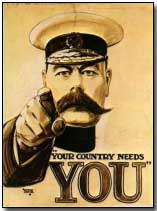Feature Articles - The Most Popular War in History - War is Declared
 On
August 4th 1914, Great Britain declared war on Germany. The date is
interesting in that this country came in a day late. For it was not
until German forces entered Belgium in direct violation of that country's
neutrality that Britain came in.
On
August 4th 1914, Great Britain declared war on Germany. The date is
interesting in that this country came in a day late. For it was not
until German forces entered Belgium in direct violation of that country's
neutrality that Britain came in.
Even though Germany was already at war with both France and Russia, the obligations of the Entente Cordiale do not, of themselves, seem to have been sufficient to bring the British in. However the invasion of Belgium, in clear breach of that country's neutral status led to a British ultimatum followed by war.
Lord Kitchener, whose distinguished career in Egypt, the Sudan, South Africa and India earned him appointment as Secretary for War, brought out a hastily-drafted recruitment leaflet. Although inelegantly drafted, it was sufficient to bring men out in their thousands during the first weeks of war.
The actual progress of the war and records of experience in the trenches is covered very well in other parts of this web-site, and will not be repeated here. You would be best advised to click here to get to the home page, and browse or surf from there.
During the war itself recruitment propaganda showed quite a degree of ingenuity. One innovation was the so-called 'pals battalions' (men from the same town), giving people at local level a greater sense of helping with the national effort. In view of the general background of ideas some of the content of posters is interesting. Here for instance are a couple which might well have been designed to appeal to readers of such as the Boys Own Paper, Young England and others that banged the patriotic drum:
ENGLAND WHAT THOU WERT THOU ART!
Gird thee with thine ancient might
Forth and God defend the Right!
And:
There's Drake and Blake and Nelson, and 'Bobs' who pulled us through
Now it's Kitchener and Jellicoe and George the Fifth and YOU.
The Lord help honest people and the Foul Fiend take his own,
For you shall smash the Mad Dog's head and stamp his rabbles down
And keep the old flag flying from Wick to Malabar
Oh, it's war, war, war!
By Dad's best hat, it's war.
['Bobs' was Lord Roberts, Britain's No. 1 soldier at the turn of the 19th and 20th centuries. Note the three naval heroes to one general in the first line.]
There were also appeals to emotional blackmail - for instance the famous one of small child asking Dad: 'What did you do in the Great War, Daddy?' Daddy, who somehow escaped service, looks suitably ashamed. My father quotes several more in addition to this and 'Your country needs YOU', for instance:
'Lads, you're wanted. GO and HELP'
'Why are you stopping HERE when your pals are out THERE?'
'You're proud of your pals in the Army, of course! But what will your pals think of YOU?'
People who didn't join up instantly often found themselves ostracised or pointed at even if the reasons for delay were sensible, such was the moral (or moralising) head of steam, itself a feature of the many peoples' outlook at the time. My grandfather (mentioned by my father on p123 of his book) was a bright lad with a realistic, guilt-free opinion of his abilities and where they might be best used. So instead of joining the infantry instantly at his eighteenth birthday, he decided to wait until he was old enough at 19 to join the Royal Military Academy at Woolwich where he could learn to use his brain.
This behaviour seems to have brought pointed comment of the 'hint, hint' type from at least one female relation. (During the Second World War, by contrast, someone like my grandfather would have been held back compulsorily, either for the duration if it was felt his skills would be better used in a 'reserved' occupation, or alternatively until he was eligible for somewhere like the Woolwich Academy. No stigma would have been attached to anyone for waiting like this, or even for not serving at the front at all unless it was somehow known he was a skiver).
Realistic portrayals of trench life were lacking, something which caused concern in some quarters. Some felt it a reflection on the country's moral fibre that a campaign had to be run at all, others felt the advertising campaign cheapened and trivialised the realities of life in the front line, especially in the trenches. However combined with the death-or-glory sentiments which had been brewing since at least the late nineteenth century, it was sufficient to bring in two and a half million volunteers.
Next - Conclusion
Article and photographs contributed by Humphrey Reader.
"ANZAC" was coined in s1915 from the initials of the Australian and New Zealand Army Corps.
- Did you know?
